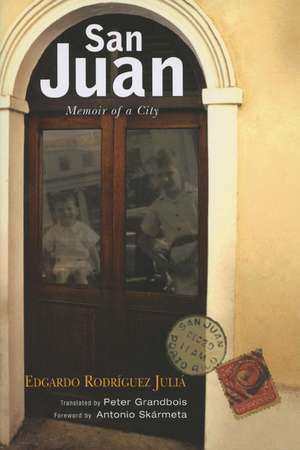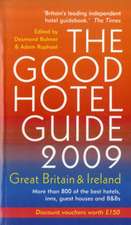San Juan: Memoir of a City: THE AMERICAS
Autor Edgardo Rodríguez Juliá Editat de Peter Grandbois Cuvânt înainte de Antonio Skármetaen Limba Engleză Paperback – 23 mai 2007
San Juan: Memoir of a City conducts readers through Puerto Rico's capital, guided by one of its most graceful and reflective writers, Edgardo Rodríguez Juliá. No mere sightseeing tour, this is culture through immersion, a circuit of San Juan's historical and intellectual vistas as well as its architecture.
In the allusive cityscape he recreates, Rodríguez Juliá invokes the ghosts of his childhood, of San Juan's elder literati, and of characters from his own novels. On the most tangible level, the city is a place of cabarets and cockfighting clubs, flâneurs and beach bums, smoke-filled bars and honking automobiles. Poised between a colonial past and a commercial future, the San Juan he portrays feels at times perilously close to the pitfalls of modernization. Tenement houses and fading mansions yield to strip malls and Tastee Freezes; asphalt hems in jacarandas and palm trees. "In Puerto Rico," he muses, "life is not simply cruel, it is also busy erasing our tracks." Through this book—available here in English for the first time—Rodríguez Juliá resists that erasure, thoughtfully etching a palimpsest that preserves images of the city where he grew up and rejoicing in the one where he still lives.
In the allusive cityscape he recreates, Rodríguez Juliá invokes the ghosts of his childhood, of San Juan's elder literati, and of characters from his own novels. On the most tangible level, the city is a place of cabarets and cockfighting clubs, flâneurs and beach bums, smoke-filled bars and honking automobiles. Poised between a colonial past and a commercial future, the San Juan he portrays feels at times perilously close to the pitfalls of modernization. Tenement houses and fading mansions yield to strip malls and Tastee Freezes; asphalt hems in jacarandas and palm trees. "In Puerto Rico," he muses, "life is not simply cruel, it is also busy erasing our tracks." Through this book—available here in English for the first time—Rodríguez Juliá resists that erasure, thoughtfully etching a palimpsest that preserves images of the city where he grew up and rejoicing in the one where he still lives.
Best Books for Regional General Audiences, selected by the American Association of School Librarians and the Public Library Association
Preț: 158.36 lei
Nou
Puncte Express: 238
Preț estimativ în valută:
30.30€ • 31.72$ • 25.07£
30.30€ • 31.72$ • 25.07£
Carte tipărită la comandă
Livrare economică 07-21 aprilie
Preluare comenzi: 021 569.72.76
Specificații
ISBN-13: 9780299203740
ISBN-10: 0299203743
Pagini: 188
Ilustrații: 10 maps
Dimensiuni: 152 x 229 x 13 mm
Greutate: 0.26 kg
Ediția:1
Editura: University of Wisconsin Press
Colecția University of Wisconsin Press
Seria THE AMERICAS
ISBN-10: 0299203743
Pagini: 188
Ilustrații: 10 maps
Dimensiuni: 152 x 229 x 13 mm
Greutate: 0.26 kg
Ediția:1
Editura: University of Wisconsin Press
Colecția University of Wisconsin Press
Seria THE AMERICAS
Recenzii
“To read San Juan: Memoir of a City is to trace and retrace the contours of a lived space, of neighborhoods populated by fascinating real and imaginary characters, of a centuries-old history radically transformed in the last sixty to seventy years.”—Lawrence La Fountain-Stokes, University of Michigan
“An elegant pirouette through civic as well as personal history.”—Antonio Skármeta, from the foreword
“Detailed with a vibrant nostalgia . . . . This book is filled with insights into the dramatic changes he experienced as Puerto Rico moved from an agrarian society to an industrialized modern economy.”—Gustavo A. Mellander, Hispanic Outlook
Notă biografică
Edgardo Rodríguez Juliá teaches literature and creative writing at the University of Puerto Rico. Among his many books are La renuncia del héroe Baltasar (1974, translated into English in 1997 as The Renunciation), El entierro de Cortijo (1983, published in a bilingual edition in 2004 as Cortijo’s Wake), La noche oscura del Niño Avilés (1984), and Sol de medianoche (1999).
Peter Grandbois is assistant professor of English at California State University, Sacramento.
Descriere
San Juan: Memoir of a City conducts readers through Puerto Rico's capital, guided by one of its most graceful and reflective writers, Edgardo Rodríguez Juliá. No mere sightseeing tour, this is culture through immersion, a circuit of San Juan's historical and intellectual vistas as well as its architecture.
In the allusive cityscape he recreates, Rodríguez Juliá invokes the ghosts of his childhood, of San Juan's elder literati, and of characters from his own novels. On the most tangible level, the city is a place of cabarets and cockfighting clubs, flâneurs and beach bums, smoke-filled bars and honking automobiles. Poised between a colonial past and a commercial future, the San Juan he portrays feels at times perilously close to the pitfalls of modernization. Tenement houses and fading mansions yield to strip malls and Tastee Freezes; asphalt hems in jacarandas and palm trees. "In Puerto Rico," he muses, "life is not simply cruel, it is also busy erasing our tracks." Through this book—available here in English for the first time—Rodríguez Juliá resists that erasure, thoughtfully etching a palimpsest that preserves images of the city where he grew up and rejoicing in the one where he still lives.
In the allusive cityscape he recreates, Rodríguez Juliá invokes the ghosts of his childhood, of San Juan's elder literati, and of characters from his own novels. On the most tangible level, the city is a place of cabarets and cockfighting clubs, flâneurs and beach bums, smoke-filled bars and honking automobiles. Poised between a colonial past and a commercial future, the San Juan he portrays feels at times perilously close to the pitfalls of modernization. Tenement houses and fading mansions yield to strip malls and Tastee Freezes; asphalt hems in jacarandas and palm trees. "In Puerto Rico," he muses, "life is not simply cruel, it is also busy erasing our tracks." Through this book—available here in English for the first time—Rodríguez Juliá resists that erasure, thoughtfully etching a palimpsest that preserves images of the city where he grew up and rejoicing in the one where he still lives.










